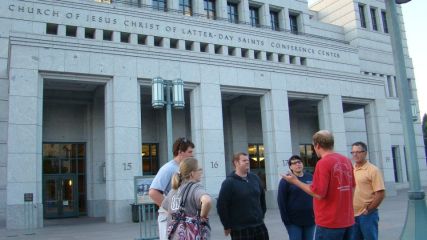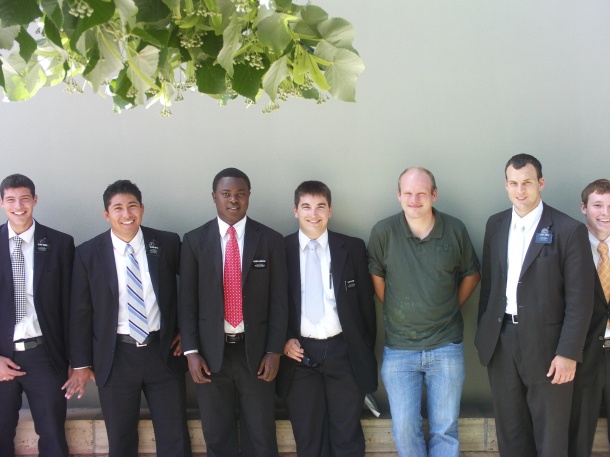
Some of you may remember a while ago we had Ned Scharisbrick from the FairMormon Podcast do an episode responding to some articles on this blog. This was a great chance to have some online communication with Ned. In the process of this he very kindly offered to have me go on his podcast and have some dialogue with him. Ned runs an episode called the 4th watch, looking out for challenges and criticisms of the Mormon faith.
For those who dont know Fair is the Foundation for Apologetics information and Research and is one of the main organizations defending Mormonism from a faithful LDS perspective.
Well this week that episode went online on the Fairblog Podcast. You can find the episode here, or listen on the audio file below.
Bobby on the Fairblog podcast.
I very much appreciated Ned having me on, and I think this was a good example of respectful dialogue. I will let the episode speak for itself rather than offering some commentary on it myself, but we discussed the issue of what does it mean to be saved.
One thing I would say is in the introduction to the episode text it says this:
Mr. Gilpen comes from the evangelical Calvinist tradition of Christianity and the term ‘anti’ may come across as disrespectful to those who are actually kind to members of the LDS Church. The term anti in this discussion is used to represent those who are against or openly opposed to the teachings of the Church of Jesus Christ of Latter-day Saints, much as the term “pro” could be used for those who agree with or openly promote the teachings of the LDS Church.
I appreciate the explanation of what Anti-Mormon means here but I am still sad to see this used, I think it would be much more helpful if those engaged in LDS Apologetics start to publically state the difference between those that are LDS Critics and Anti-Mormons. As many Mormons maybe even to this episode will switch off when they see this term. Anti-Mormons in the mind of many Mormons refers to people who are opposed to them as people and are to be avoided, this is by no means what I am, and I think Ned does appreciate this.
However again all of that said I very much appreciate Ned having me on and I look forward to any comments that may come.
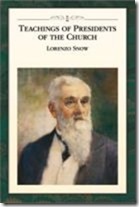
“Cultivate a spirit of charity; be ready to do for others more than you would expect from them if circumstances were reversed.”
Obviously doing good to others is a good and Godly principle. LDS, like main stream Christians seek to follow this biblical principle of Charity and service, loving your neighbour, treating others as you would expect to be treated yourselves. This chapter begins with a story of Lorenzo and his family’s exodus from Norvoo, they helped a man who needed a ride on their wagon and in turn the man (who happened to work in repairing wagons,) repaired the wagon for the family when they were in desperate need. Lorenzo commented that this situation reinforced in him the principle that one favour often leads to another.
the next heading states…
“We are Children of the same Heavenly Father, and we have been sent into the world to do Good.”
Lorenzo speaks here of the LDS belief that everyone on earth is literally brothers and sisters as they were conceived and born in heaven as spirit children of God the Father and his wife. Therefore with this in mind he advocates LDS to treat their kin well, treating them as they would a brother or a sister.
As part of this doing good to others, Lorenzo also calls LDS to share their learning, saying that by “communicating his information while engaging in learning it,” a person can learn all the more. Pursuing education is strongly encouraged within the LDS church.
Seek ye out of the best books words of wisdom, seek learning even by study and also by faith.” -Doctrine and Covenants 109:7
Lorenzo goes on to discuss how we should seek the good of our friends, and sacrificing for the sake of others.
“We see this in the Savior, and in brother Joseph, and we see it in our President ( Brigham Young ). Jesus, brother Joseph and brother Brigham have always been willing to sacrifice all they possess for the good of the people.”
I have to say that I am offended here on behalf of our Savior that Lorenzo would even think to compare anyone to Him. By all means advocate living a sacrificial life, and yes perhaps Joseph Smith and Brigham Young did this to some extent, but I think Jesus is in a league of His own.
I think to some extent Lorenzo puts across the idea that, one favour leads to another in return, to help others does you good, in teaching others you will learn more, by sharing knowledge your, “mind will expand, and that light and knowledge which he (you) had gained would increase and multiply” Sure I agree that their are “treasures in heaven,” like in the story of the servants who are given talents to use wisely, (Matthew 25:14-30), those who do use them wisely will receive a reward. But then we also have the story of the good Samaritan, what was his reward?
To know he had done the will of the Father, and perhaps more in the next life. Did he receive a reward in this life we’ll never know, but I believe he did this good service to his fellow man purely out of a love for and obedience to God.
Quite a short post for me, I think we’re largely in agreement that we should do good to others, as the Bible instructs.
As always I’m happy to receive your feedback
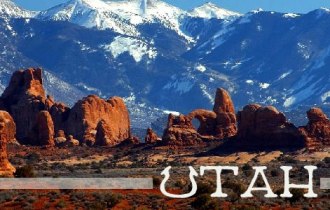
Hey there all. As many who have been reading this blog for a while will know, I have been to Utah on mission trips for 3 years running between 2010 and 2012. These have been seriously some of the best times of my life. I have been on a daily basis actively involved in reaching out to LDS people as well as meeting, training and connecting with various Christians from Utah and other parts of the USA. My main contact is Russ East from Utah Partnerships for Christ.
Russ runs a ministry hosting mission trips from all over America and the world seeking to reach out to the residents of Utah. On every visit I have stayed and worked with Russ, being involved with outreach at Temple Square in Salt Lake City and also the Manti Miracle Pageant, where each night 14,000 Mormons come and watch a re-enactment of their theology and believed history, here is a discussion I had there.
As well as reaching out to Mormons on my last trip I was also involved with training and equipping Christians. Here I am giving some guys a tour of temple square.
During these visits I have also been on Heart of the Matter with Shawn Mccraney twice, here is one of my appearances at the end of this video.
So what is my point in all this? Well I want to go back to Utah, every year from 2014 onwards. In fact my wife Vicky and I are in genuine hope and prayer that one day in the next 5 years or so we want to move to and live in Utah. However these trips are expensive and so this post is an unashamed request, that you would consider supporting me to go to Utah on a mission trip in 2014.
For this trip I plan to:
- Be very active in outreach to LDS people in Utah, particularly at the Manti Miracle Pageant.
- Make contact with local Christian Churches in Utah, seeking to build relationships and raise support for a permanent Utah move.
- Build relationships with Key Christians in Utah already active in evangelism to LDS people.
- Report back to you on what is going on and keeping you up to date in all that you are supporting me to do over there.
This is your chance to have an active impact on LDS people not only in the UK but around the world. Please prayerfully consider supporting me for this trip. Anything you contribute however big or small with be massively significant in helping me to make this trip. I estimate I need to raise around £1000 to go for around two weeks. You can contribute by emailing me on [email protected] for info, You can also give via paypal by clicking here. Or by clicking the paypal button below.
Thank you for reading, more updates on this to follow.

Hi there all this is just a quick update to let you know that we have Russ East currently staying in the UK for a few days. Russ runs our parent ministry Utah Partnerships for Christ. Today I recorded an interview with Russ that has gone onto our ministry podcast talking about what he does in Utah and why, you can find that here. Or just listen to it on this page below.
Also if you are in the Middlesbrough area tomorrow night on the 4th November. We are having an event at Melbourne House on Newport Road at 7:30pm where Russ will be sharing his story of leaving Mormonism and coming to Christ. If you would like more information please contact me, my details are on the left of this article. There is also a facebook event for this here.
thanks a lot
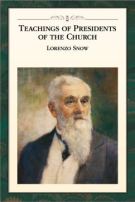
For this review I am going to focus on the part of the chapter entitled Teachings of Lorenzo Snow and not look at the beginning of the chapter entitled From the Life of Lorenzo Snow. I have chosen to do this for two reasons: firstly, I feel that my role in writing this post is to address the differences between LDS teaching, belief and doctrine and Biblically-based Christian teaching, and secondly, I found that I had so much I wanted to deal with in the ‘teachings’ section that it seemed unnecessary to dwell on the other areas.
I would first like to look at this bold claim: “That Adam, Enoch, Noah, Abraham, Moses, and other ancient worthies had this religion successively, in a series of dispensations, we, as a people, verily believe. … Mormonism, in short, is the primitive Christian faith restored, the ancient Gospel brought back again.” I would like to know what evidence the LDS church has to substantiate such a claim. Their religion is based heavily on the idea of eternal families being sealed together in exclusive temple ceremonies. Through these ceremonies, people can progress along a path that can ultimately lead to godhood. These principles are not found in the accounts we have of Adam, Enoch, Noah, Abraham and Moses and they certainly do not resonate with the teachings, actions, life, death and resurrection of Jesus as contained in the New Testament. Neither do the epistles addressed to the early churches contain anything that can be described as Mormonism. No path to godhood, no salvation by “grace after all we can do”, no belief in one Prophet, seer and revelator overseeing and running one all-encompassing organisation, no Aaronic and Melchizedek Priesthoods, no exclusive temple ceremonies, no obligation to pay ten per cent of all income to the prophet’s organisation. A claim such as the one above really ought to be backed up with evidence to support it.
In the paragraph following the one quoted above, we read of a kingdom being established where “light and intelligence shall be so generally diffused that it shall no longer be necessary for any man to say to his fellows, “Know ye the Lord, but all shall know him, from the least unto the greatest;” [see Jeremiah 31:34]”. Yet the Lord of this Kingdom, who should be so easy to identify, is in fact rather difficult to get a grasp of when we actually look in detail at LDS sources:
“Jesus, our elder brother, was begotten in the flesh by the same character that was in the garden of Eden, and who is our Father in Heaven” (Brigham Young in ‘Journal of Discourses’, 1:50-51)
“And behold, he shall be born of Mary, at Jerusalem which is the land of our forefathers, she being a virgin, a precious and chosen vessel, who shall be overshadowed and conceive by the power of the Holy Ghost, and bring forth a son, yea, even the Son of God.” (Alma 7:10) Please note that this verse not only incorrectly states the birthplace of Jesus, but also contradicts the previous quote.
Therefore, it does not appear clear that the teaching of ‘the Kingdom’ in relation to ‘the Lord’ is clear or consistent even with itself or with the Bible. So it would seem that the ‘light and intelligence’ brought about by the LDS church has not been helpful in aiding people to ‘know the Lord’.
This section of the chapter also refers to the prophecy made in Joel which states that “your sons and your daughters shall prophesy”. This is included to build a picture of what the ‘Kingdom’ that the LDS church is establishing is like. Old Testament scripture is being used here to try and legitimise LDS claims, yet to say that women in the LDS version of God’s kingdom can authoritatively ‘prophesy’ is ridiculous. That is the domain of a select few. That select few certainly contains no women!
Continuing the description of this kingdom, we read that “God has set up His Church and Kingdom on the earth for the benefit and blessing of the human family”. Yet, if that is the case, one has to wonder why God would let this kingdom fail so badly in Mormon eyes from the end of the era of the first apostles to Joseph Smith’s ‘first vision’ (a period of around 1700 years) if it were his intention to benefit and bless the human family. The words of Jesus in Matthew 16:18 (I will build my church; and the gates of hell shall not prevail against it) and 24:35 (Heaven and earth shall pass away, but my words shall not pass away) should be enough to make it clear that God’s intentions were that his truth and church would not fall away or be removed from the earth and therefore the notion of a restoration is not something that God would ever have deemed necessary. The chapter goes on to say: “Now talk about this kingdom being destroyed! … Why, you might as well try to pluck the stars from the firmament or the moon or the sun from its orbit! It never can be accomplished, for it is the work of the Almighty.” Mormon teaching would suggest that the church established by Jesus did not even last as long as the LDS church has currently lasted, so how could any Mormon have confidence in the durability of their own organisation when it makes such a claim about the New Testament church established by Jesus himself? The Kingdom of God seems to be a pretty flimsy concept in the LDS understanding.
A little further on is a statement that clears up any doubts about what the LDS church teaches about the Bible: “This Church will stand, because it is upon a firm basis. It is not from man; it is not from the study of the New Testament or the Old Testament”. It would appear that for Mormons there is nothing secure about God’s revealing of his nature, identity and personality in either the Old or New Testament. For an organisation that claims to be Christian, and the only 100% authentic version of Christianity at that, this is quite a bold claim regarding the importance of using the New Testament to understand and come to know the person of Jesus! The chapter continues to explain that the LDS church has, “come directly from the Lord. The Lord has shown it to us by the revealing principle of the Holy Spirit of light”. Really? So you can ignore anything the New Testament has to say about Jesus and instead trust in a religion:
based upon a book written by a man using a rock in a hat to tell him what words should be written,
which contains a book that is built upon a provable lie (the claim that the papyrus used for the translation of the Book of Abraham had writings on it which were written by Abraham himself),
which has contradictory teachings on the nature of God: “How much unbelief exists in the minds of the Latter-day Saints in regard to one particular doctrine which is revealed to them, and which God revealed to me — namely that Adam is our father and God” – Brigham Young, and then: “We warn you against the dissemination of doctrines which are not according to the scriptures and which are alleged to have been taught by some General Authorities of past generations, such, for instance is the Adam-God theory. We denounce that theory and hope that everyone will be cautioned against this and other kinds of false doctrine” – Spencer Kimball. Contradictory positions could also be provided here for the LDS position of polygamy and the rights of black people to hold ‘the priesthood’.
We then read that the Lord “opens to us the secrets of the celestial kingdom” yet neither Jesus nor the early church leaders teach anything about the celestial kingdom or mention anything that would even support the notion of meriting the right to live with God in heaven after we die on the basis of our own actions. In fact the exclusivity of access to the celestial kingdom being through temple attendance, participation and worthiness is in direct contradiction with the Bible. Consider these verses:
“Jesus, when he had cried again with a loud voice, yielded up the ghost. And, behold, the veil of the temple was rent in twain from the top to the bottom” Matthew 27:50-51
“For this is good and acceptable in the sight of God our Saviour; Who will have all men to be saved, and to come unto the knowledge of the truth. For there is one God, and one mediator between God and men, the man Christ Jesus; Who gave himself a ransom for all, to be testified in due time” 1 Timothy 2:3-6
“For he is our peace, who hath made both one, and hath broken down the middle wall of partition between us; Having abolished in his flesh the enmity, even the law of commandments contained in ordinances; for to make in himself of twain one new man, so making peace; And that he might reconcile both unto God in one body by the cross, having slain the enmity thereby: And came and preached peace to you which were afar off, and to them that were nigh. For through him we both have access by one Spirit unto the Father. Now therefore ye are no more strangers and foreigners, but fellow citizens with the saints, and of the household of God; And are built upon the foundation of the apostles and prophets, Jesus Christ himself being the chief corner stone; In whom all the building fitly framed together groweth unto an holy temple in the Lord: In whom ye also are builded together for an habitation of God through the Spirit.” Ephesians 2:14-22
These verses demonstrate clearly that the notion of ‘secrets of the celestial kingdom’ flies directly in the face of the New Testament understanding, and therefore original Christianity’s understanding, of what the teachings, suffering, life, death and resurrection of Jesus mean for us.
The chapter continues: “Our work is … to become more and more perfect as we advance in years”. This is a nonsense. One cannot become ‘more perfect’. Perfection ultimately means a state that can not be improved upon. So to suggest that people can become more and more perfect is impossible. It is also unbiblical to say that any improvement in our condition is down to ‘our work’. Our work is as “filthy rags” (Isaiah 64:6) and the good work that goes on in the heart of a believer is not attributable to the believer, but rather to God: “he which hath begun a good work in you will perform it until the day of Jesus Christ:” (Philippians 1:6)
A little later on, the chapter discusses the commitment and sacrifices expected of LDS members to the cause of their faith or the building up of their ‘kingdom’. Doctrine and Covenants section 98 is quoted here: “I will prove you in all things, whether you will abide in my covenant, even unto death, that you may be found worthy; for if ye will not abide in my covenant, ye are not worthy of me.” Again, we have here an example of the God of Mormonism telling his people that by sticking to the rules, they will then be worthy of him, and that if they fail to do this, they are not worthy of him. Yet we know from the Bible that none is worthy of God (Romans 3:23) and that one is only ‘made worthy’ or justified by the free gift of grace (Romans 3:24) rather than by trying to earn worthiness.
Continuing on in the chapter, LDS believers are reminded that they “are engaged in the work of God. The prospects before us are glorious” and they are then told that they “may increase in knowledge and power”. I am saddened that these appeals to glory of the self and the acquisition of power for one’s self are being made. Is all the effort that this chapter is asking LDS members to make being done for such purposes? Again I turn to Romans to demonstrate the Bible’s view of whose glory we should be concerned with, “if children, then heirs; heirs of God, and joint-heirs with Christ; if so be that we suffer with him, that we may be also glorified together. For I reckon that the sufferings of this present time are not worthy to be compared with the glory which shall be revealed in us.” (Romans 8:17-18) Therefore, believers inherit God’s righteousness and glory, it is not about a path of progression to our own state of godhood where the power and glory are our own. As that famous prayer makes clear: “thine is the kingdom, and the power, and the glory, for ever”.
The conclusion of the chapter builds on this theme of sacrifice in the cause of the LDS church: “I would not give the ashes of a rye straw for any religion that was not worth living for and that was not worth dying for; and I would not give much for the man that was not willing to sacrifice his all for the sake of his religion.” I find this statement problematic since there are a great many people, from a wide variety of religions, who have suffered and died due to their commitment to a sincerely held faith. Such events reveal the depth of that person’s faith and not the veracity of their religion. The theme of persecution is a recurrent one in LDS teaching materials and most LDS are well versed in the notion of being a ‘peculiar people’ and suffering for standing out in this way. It is certain that the early LDS church members underwent some terrible ordeals at certain times and I would not want to make light of that, however, it is worth pointing out that often the people were suffering for their leaders’ practice of polygamy, or in response to a perception that the communal, close-knit Mormon way of life at that time represented a threat in terms of the LDS potentially being a political bloc, or a closed-off unit of industry, productivity and cultural isolation. Let’s not forget why Joseph Smith was even in Carthage Jail in the first place. Whatever the rights or wrongs of the treatment meted out to the early LDS, I think it would be a misrepresentation to suggest that they were suffering for their faith in Christ. Christians this very day are being persecuted around the world for following Jesus and for refusing to renounce their faith. Their struggles are well-documented here: http://www.releaseinternational.org/ Someone who truly suffered for Christ, and whose book I would recommend as probably the most inspirational thing I have ever read outside of scripture, is Richard Wurmbrand. He was a Christian pastor in Romania during the era of communism. He was imprisoned and horrifically abused for many years but never lost his faith. His actions and life speak of a true devotion to Christ and his actions were imbued with total trust in the loving role of Jesus in his life. To conclude my review I will leave you with his words:
“I have seen Christians in Communist prisons with fifty pounds of chains on their feet, tortured with red-hot iron pokers, in whose throats spoonfuls of salt had been forced, being kept afterward without water, starving, whipped, suffering from cold–and praying with fervor for the Communists. This is humanly inexplicable! It is the love of Christ, which was poured out in our hearts.”

When I come to review an edition to Ensign magazine, I am always struck by how to review a magazine that covers a great many topics and areas for analysis. In this particular edition, two particular themes struck me. The first occurs in the article ‘The Divine Mission of Jesus Christ: Creator’ where the theme of creation by the power of priesthood. The second theme runs through many of the articles in this edition, the theme of temple and temple worship. These ideas are very important to our understanding of Mormon theology.
Our first article of interest comes from the Relief Society section. In this very small but very interesting article, the author argues that ‘Jesus Christ “created the heavens and the earth” (3 Nephi 9:15). He did so through the power of the priesthood under the direction of our Heavenly Father (see Moses 1:33)’. When we investigate the verse from Moses, we can see the link with what the author is arguing for;
And worlds without number have I created; and I also created them for mine own purpose; and by the Son I created them, which is mine Only Begotten. (Moses 1:33).
The verse at first seems to be in line with Christian teaching. Christianity would argue that Jesus created all the worlds in all creation (Genesis 1). There are some unique Mormon positions though in this article that are fascinating to investigate. The first position of interest is the ‘power of priesthood’ that the author argues for in the creation of the universe. The orders of priesthood are incredibly important in Mormonism as discussed in previous articles therefore it is not surprising to see this idea being married into the narrative of creation. What is interesting though is that nowhere in the Genesis text does it mention the ‘power of priesthood’. In fact the Moses text doesn’t mention this either. One wonders whether the author of the article has married a Mormon theological principle into a text where it doesn’t appear to strengthen the position. Using the priesthood in this way is not surprising given the next paragraph goes onto argue that one must become ‘worthy to return to live with Him’. One cannot become worthy unless one is a priesthood holder in good standing.
It is on this note that we come to our second theme of temple. The idea of worthiness and using ‘our agency to obey’ that we see with the first theme is also key to our theme of temple as only a faithful Mormon with a Temple Recommend can gain entry. The idea of temple and the idea of worthiness are intrinsically linked but it is not this idea we shall explore. Instead we shall be exploring the idea of the necessity of temple worship. In his article, David L. Packard argues that faithful Mormons should be making regular time for temple worship and practicing temple ordinances as part of their worship to God. Packard extols the virtues of sacrifice that ward leaders and members make to get the faithful to the temple worship and to observe the ordinances. The physical location for certain high forms of worship has been elevated in Mormonism to an extent that is not often seen in Christianity. This observance of temple is interesting. It is obvious that the temple was incredibly important in the Old Testament. It was incredibly important to the Jews at the time of Christ. What is clear however is that the New Testament writers are envisioning a new relationship with the temple. Let us consider these verses:
As he approached Jerusalem and saw the city, he wept over it and said, ‘If you, even you, had only known on this day what would bring you peace – but now it is hidden from your eyes. The days will come upon you when your enemies will build an embankment against you and encircle you and hem you in on every side. They will dash you to the ground, you and the children within your walls. They will not leave one stone on another, because you did not recognise the time of God’s coming to you.’ (Luke 19:41-44)
If anyone destroys God’s temple, God will destroy that person; for God’s temple is sacred, and you together are that temple. (1 Corinthians 3:17)
I did not see a temple in the city, because the Lord God Almighty and the Lamb are its temple. (Revelation 21:22)
The verses from Luke are important as they are part of the prophecy that the temple will be torn down as well as the whole city of Jerusalem, a prophecy that came true in AD70. What is important to recognize is that at no point in the New Testament does it talk of a physical rebuilding of the temple. What can be seen though in the New Testament though is the idea of the ‘temple incarnate’. This idea can be seen in the last two quotations. The 1 Corinthians verse shows us that the church together is the temple. All of humanity that acknowledges Jesus as Lord is a brick in that incarnate temple. The city that John saw in Revelation 21 did not have a temple because the Lord and the Lamb, the one God are the temple. If the New Testament is clear on this idea of the incarnate temple replacing the physical temple, then Mormonism reverting back to worship in a physical temple where special rituals are necessary seems a bit odd and out of kilter with the message of the New Testament.
When we try to review an edition of Ensign, the challenge is always great given the potential scope and depth that can sometimes be needed. We can see though through the Relief Society article that the concept of progressive revelation within Mormonism is very much alive. Whilst the idea that the ‘power of priesthood’ being at work during the creation of the world though Jesus Christ is not explicit in the LDS scriptures, including the verse quoted from Moses, it should not be surprising given the doctrine of progressive revelation that this ‘power of priesthood’ has been married into the creation doctrine and that this is generally agreed upon by the LDS community. It wouldn’t be in the Ensign if it weren’t a generally accepted doctrine. We can also see the physical temple is still important to Mormonism as opposed to the New Testament idea of the ‘incarnate temple’. It is also interesting when we consider that in the Old Testament in the age of temples, there was only one temple whilst in the Mormon world, there are hundreds. These temples are central for fulfilling Mormon rituals that are necessary for exaltation. In short, exaltation is impossible without regular temple observance. Exaltation by grace is not part of the picture.
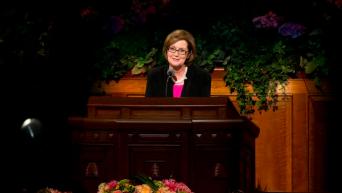
Finally we reach the Relief Society, This years Relief Society talks focus on the issue of Covenant keeping. The first talk was by Linda K Burton, Relief Society General President, and was entitled The Power Joy and Love of covenant Keeping. Linda begins with the story of a Woman preparing for Baptism she commends this women for her desire to be made clean, giving up her old life in order to make covenants with God.
Linda says
“She was so anxious to give away all of her sins that she might be washed clean and feel the redeeming love of the Savior. I was inspired that morning by her desire to become both physically and spiritually clean.”
Now in Mainstream Christianity it is taught that once a person has given themselves to Christ, they are washed clean entirely, permanently. I pity this lady that Linda speaks of, as in LDS theology, the cleansing she so desperately sought after would be a temporary thing, she would be clean only for a moment, until the next unholy thought or word then she would again be stained by sin. Of course this can then be rectified by the taking of the Sacrament.
Speaking of the Sacrament Linda then goes on to say…
“Why does the Savior put so much importance upon the sacrament, dear sisters? What importance does this weekly renewal of our baptismal covenants play in our lives? Do we recognize the ability of the Savior to completely cleanse us every week as we worthily and thoughtfully partake of the sacrament?”
This is an interesting teaching of the LDS Church. When Jesus died on the cross what did he really do?
Did he die to pay the price for all of our sins or just some of them? And if you say just some of them, was his sacrifice therefore not sufficient?
When we are told in the Bible that Jesus died for our sins, it wasn’t just talking about those we have already committed. God knows that we sin, we can’t help ourselves. Seriously how long do you think you can go without sinning, an hour? really? What about those sinful thoughts! A day? I don’t believe you! We all sin, the Bible tells us that we have a sin nature, we are corrupt, the bible tells us that we are ( or were if you are saved ) in sinful flesh, ( or a sinful nature,)
Ephesians 2:3 (NASB)
3 Among them we too all formerly lived in the lusts of our flesh, indulging the desires of the flesh and of the [b]mind, and were by nature children of wrath, even as the rest.
Those who have not been freed by Christ are slaves to corruption.
” Peter 2:19
19 promising them freedom while they themselves are slaves of corruption; for by what a man is overcome, by this he is enslaved.
We all sin, and Christ’s sacrifice was sufficient to cover all of our sin…..
Colossians 2:13-14
13 When you were dead [a]in your transgressions and the uncircumcision of your flesh, He made you alive together with Him, having forgiven us all our transgressions, 14 having canceled out the certificate of debt consisting of decrees against us, which was hostile to us; and He has taken it out of the way, having nailed it to the cross.
Does this sound like something that needs to be renewed once a week? This verse talks about having been taken from death to life. You can’t then go back into death again.
It says He has Cancelled the Certificate of Debt! God knows every sin you will ever commit, and if He says your debt against Him is cancelled, He is including the sins you do not yet know about, because He does know about them.
He has taken this Certificate of Debt against you ( if you are His ) and nailed it to the cross! Where were your sins dealt with? On the cross 2000 years before you committed them.
So what is the Sacrament?
A sacrament is a visible manifestation of the word. The bread and wine in the Lord’s Supper are considered sacraments in that they are visible manifestations of the covenant promise of our Lord: “In the same way, after the supper he took the cup, saying, ‘This cup is the new covenant in my blood, which is poured out for you,’” (Luke 22:20).
It’s not the sacrament that cleanses you but the blood the saviour spilled for you 2000 years ago, there he nailed your sins to the cross. As I said this talk is about covenant keeping, Linda goes on to share a story of a Mother with young children who finds it hard to focus on a Sunday. With this I can relate, as a Mother of Two young Children, and the idea of preparing yourselves as the woman in the story does, for the taking of the sacrament, is definitely good advice, any Christian would agree as it says in Corinthians,
1 Corinthians 11:28
28 But a man must examine himself, and in so doing he is to eat of the bread and drink of the cup.
Linda goes on to discuss trial and tribulation, and how God can use the tribulation in our lives to bring about good. She illustrates with a story of a historic Tabinacle in ProvoUtah, which was destroyed by fire, the shell of this building was later used in creating an LDSTemple. A building of much greater standing. To the Women experiencing Trial in their lives she says this…
“Sisters, I testify that the Lord has a plan for each of our lives. Nothing that happens is a shock or a surprise to Him. He is all-knowing and all-loving. He is eager to help us, to comfort us, and to ease our pain as we rely on the power of the Atonement and honor our covenants. The trials and tribulation that we experience may be the very things that guide us to come unto Him and cling to our covenants so that we might return to His presence and receive all that the Father hath”.
As a Christian I agree that the Lord can and does use tribulation and hardship in our lives and turns it around for good, I agree that these times of trial should lead us into His loving arms. But the only covenant I cling to is the one that Jesus made, in his blood to bring about my salvation.
Now a Christian reading this post might be unaware of the covenants within Mormonism. When someone is Baptized into the LDSChurch they are entering into a covenant relationship but unlike the covenant relationship Christians enter as they are converted, The Mormon will be expected to hold to promises that he/She has made.
Here is a list of those promises…
(At Baptism I Covenant with the Lord to:
1. Come into the fold of God (become a member of the Church
of Jesus Christ).
2. Be called his son or daughter (take upon me the name of Christ).
3. Bear others’ burdens, that they may be light; mourn with those that
mourn; and comfort those in need of comfort (help others).
4. Stand as a witness of God at all times and in all things and in
all places (testify of Christ and set a good example at all times).
5. Serve God and keep his commandments.
When I Keep My Baptismal Covenants the Lord Covenants to:
1. Forgive my sins.
2. Pour his Spirit more abundantly upon me (give me the companionship
of the Holy Ghost).
3. Redeem me that I might be numbered with those of the first resurrection
and have eternal life (permit me to enter the celestial kingdom to live
with Heavenly Father and Jesus Christ).
When it says here “keep his commandments that means a number of things, including obeying the word of wisdom, (Not drinking tea/ coffee/alcohol ) and tithing, going to the temple, daily family prayers, family home evening, fulfilling your calling and home teaching. All of these may not be commandments but their certainly expectations within the Church.
There are also further covenants made in the temple. As all three of this years Relief society speakers are speaking on this issue of Covenant keeping. I want to just take a look at this issue of covenants from a Biblical perspective.
What does the Bible say about making covenants?
A covenant is a contract or agreement between two or more parties. The Bible is a covenant document. The Old and New Testaments are really Old and New Covenants. The word “testament” is Latin for Covenant.
A Covenant requires blood…
Hebrews 9:16-22 For where a [q]covenant is, there must of necessity [r]be the death of the one who made it. 17 For a [s]covenant is valid only when [t]men are dead, [u]for it is never in force while the one who made it lives.18 Therefore even the first covenant was not inaugurated without blood. 19 For when every commandment had been spoken by Moses to all the people according to the Law, he took the blood of the calves and the goats, with water and scarlet wool and hyssop, and sprinkled both the book itself and all the people, 20 saying, “This is the blood of the covenant which God commanded you.” 21 And in the same way he sprinkled both the [v]tabernacle and all the vessels of the ministry with the blood. 22 And according to the [w]Law, one may almost say, all things are cleansed with blood, and without shedding of blood there is no forgiveness.
There are many references to a New Covenant in the New Testament, but ( correct me if i’m wrong) there is no mention of New testament Christians making ongoing Covenants or vow’s to God. in fact in James 5:12 we are specifically told not to. 12 But above all, my brethren, do not swear, either by heaven or by earth or with any other oath; but your yes is to be yes, and your no, no, so that you may not fall under judgment.
Luke 22:20 And in the same way He took the cup after they had eaten, saying, “This cup which is poured out for you is the new covenant in My blood.
2 Corinthians 3:6 who also made us adequate as servants of a new covenant, not of the letter but of the Spirit; for the letter kills, but the Spirit gives life.
The New Covenant we are under is clearly different from the Old Covenant of keeping Laws and ordinances
Hebrews 9:14-16 how much more will the blood of Christ, who through [a]the eternal Spirit offered Himself without blemish to God, cleanse [b]your conscience from dead works to serve the living God?15 For this reason He is the mediator of a new covenant, so that, since a death has taken place for the redemption of the transgressions that were committed under the first covenant, those who have been called may receive the promise of the eternal inheritance.
We find no mention of Covenants that we are to keep in the New Testament, Why is this?
Romans 2:29 But he is a Jew who is one inwardly; and circumcision is that which is of the heart, by the Spirit, not by the letter; and his praise is not from men, but from God.
Ezekiel 11:18-20 When they come there, they will remove all its detestable things and all its abominations from it. 19 And I will give them one heart, and put a new spirit within [a]them. And I will take the heart of stone out of their flesh and give them a heart of flesh, 20 that they may walk in My statutes and keep My ordinances and do them. Then they will be My people, and I shall be their God.
Hebrews 8:10-12 “For this is the covenant that I will make with the house of Israel After those days, says the Lord: [g]I will put My laws into their minds, And I will write them on their hearts.
This is our Covenant with God, When someone becomes a Christian, the bible says that God gives us a new heart, He writes His laws on our minds and hearts. We’re not required to make further Covenants with God, He has given us His Covenant Promises And he has given us His word, He has also given us The Holy spirit, His Statutes and ordinances are written on our hearts. not of the letter but of the Spirit; for the letter kills, but the Spirit gives life.(2 Corinthians 3:6)
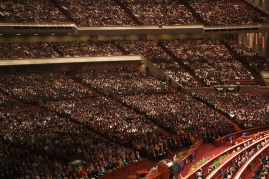
Firstly, I have to say that I am very jealous of MikeTea getting to write a response to a talk given by Randy D Funk. I would have filled plenty of lines just commenting on what a great name he has!
From the Sunday Afternoon Session, I have chosen to focus on a talk given by Kevin Hamilton who is a ‘Seventy’. I believe this puts him on what could be a similar footing to a Catholic Cardinal or Anglican Bishop, although I am happy to stand corrected as I am not an expert in Catholic or Anglican leadership hierarchy. Regardless, he is worth listening to if you are a member of the one and only church that contains the authentic, restored gospel of Jesus Christ.
Hamilton’s talk was on the theme of “continually holding fast to the iron rod”. Hamilton referred at length to Lehi’s vision from the Book of Mormon. This vision has remarkable similarities to a vision that Joseph Smith’s father, Joseph Smith Senior, was said to have had in 1811 according to Joseph Smith Jr’s mother, Lucy Mack Smith. At this time, Joseph Smith Jr. was a young boy. It is well documented that Smith Sr. was prone to vivid dreams or visions, and it is very likely that Smith Jr. was well versed in his father’s ‘tree of life’ vision when he came to write the Book of Mormon.
In the Book of Mormon version, Lehi, Nephi’s father, is sharing a vision with his family. There are many people in this vision who are trying to reach the path that leads to the tree where Lehi is standing. Alongside this path, is a rod (like a handrail) that you can hold on to in order to keep on the path leading to the tree of life. Alongside the path is a river and across from the river was “a great and spacious building; and it stood as it were in the air, high above the earth.” People in this building were looking out at those on the path and mocking them. (It has been noted by some that artistic depictions of this building used in LDS teaching material, seem to have an uncanny resemblance to the relatively recently built LDS conference centre. Do an online search for images of both and decide for yourself!) The vision talks about different groups of people who attempt to walk along the path. Some lose their way because there are mists obscuring their sight (obviously, they should have held onto the rod), others hold onto the rod and reach the fruit, but when they partake of the tree they become ashamed because they are being scoffed at so they fall away onto ‘forbidden paths’, some are drawn to the ‘great and spacious building’ and fall into the waters as they feel their way, and of course some hold continually to the iron rod, reach the tree and partake of the fruit and remain there. As visions go, there is plenty of imagery here, and this always captured my imagination hearing this story as I grew up.
Hamilton quotes Elder David Bednar, who emphasised the importance of continually holding fast to the rod of iron, and suggested that this is symbolic of people consistently reading, studying and searching the words of Christ. Hamilton says that for those who are in God’s church (i.e. the LDS church), they have covenanted to keep God’s commandments and repent as needed, since “all have sinned and fall short of the glory of God.” (Romans 3:23) I feel it is a shame that Hamilton is here encouraging the LDS to consistently read Christ’s words, yet they do not take them seriously when they do not concur with LDS teaching. An obvious example would be John 3:16, “whosoever believeth in him (God’s Son) should not perish, but have everlasting life.” Or how about: “And he said unto her, Thy sins are forgiven. And they that sat at meat with him began to say within themselves, Who is this that forgiveth sins also? And he said to the woman, Thy faith hath saved thee; go in peace.” (Luke 7:48-50) Or, “But the other answering rebuked him, saying, Dost not thou fear God, seeing thou art in the same condemnation? And we indeed justly; for we receive the due reward of our deeds: but this man hath done nothing amiss. And he said unto Jesus, Lord, remember me when thou comest into thy kingdom. And Jesus said unto him, Verily I say unto thee, Today shalt thou be with me in paradise.” (Luke 23:40-43) It is also a shame that Hamilton is using the quote from Romans 3 about falling short of the glory of God in order to keep God’s commandments and repent, when the whole point of what is being discussed in Romans 3 is that we will never satisfy the law and keep all the commandments. We can only be justified by faith. It is worth quoting the next five verses after Romans 3:23, not only to show that the LDS emphasis on works is unbiblical, but also to illustrate just how selective LDS leaders are in their use of Bible verses and how these verses are put into the context of LDS teaching rather than kept in their own context. So, here are those next five verses: “Being justified freely by his grace through the redemption that is in Christ Jesus: Whom God hath set forth to be a propitiation through faith in his blood, to declare his righteousness for the remission of sins that are past, through the forbearance of God; To declare, I say, at this time his righteousness: that he might be just, and the justifier of him which believeth in Jesus. Where is boasting then? It is excluded. By what law? of works? Nay: but by the law of faith. Therefore we conclude that a man is justified by faith without the deeds of the law.”
Hamilton also appears to be equating ‘continually holding to the rod’ to assiduous attendance of Sunday church meetings. He outlines what the purposes of the three separate parts of LDS Sunday church activities are. These three points do not include worshipping the Lord, learning of Jesus and coming to know Him more fully, or fellowshipping with God’s family.
Hamilton goes on to set himself and his family up as the perfect examples to be emulated: “Our family has committed to attend all of our Sunday meetings… We have learned that we feel good about our decision to attend our Church meetings, especially as we return to our home and continue to observe the Sabbath. We even attend all of our Sunday meetings when we are on vacation or traveling. One of our daughters recently wrote to say that she had attended church in a city where she was travelling and then added, ‘Yes, Dad, I did attend all three of the Sunday meetings.’ We know that she was blessed for this righteous decision.” So why attend your statutory three hours of Sunday church services? So that you can be just as proud as Kevin Hamilton is here. So that you can feel good about yourselves afterwards. So that you can ooze smugness by not even taking a Sunday off when you are away from your home ward, and of course, most importantly, so that you can top up your own personal righteousness account with another blessing. It all goes towards ensuring that you’ve made the grade for the Celestial Kingdom.
A couple of paragraphs on, Hamilton defines ‘holding to the rod’ in many ways. These include: striving to keep all of God’s commandments, having daily personal and family prayer, studying the scriptures daily, showing faith in Jesus, repenting, changing our hearts, being baptised, receiving the gift of the Holy Ghost and pressing forward, feasting upon the word of Christ until the very end of our lives. Yet since the early days, the LDS church has taught, and sung, that “The iron rod is the word of God” (LDS Hymn no. 274) So to hold to the rod means to hold to God’s word. Hamilton teaches that “We simply hold fast to the word of God by worshipping and attending our Sabbath meetings.” Yet if the LDS church took the word of God (i.e. the Bible) seriously, they would find that what takes place and what is taught in a Mormon church on a Sunday does not chime with it in any meaningful way. Mormons feel that they are holding fast to ‘the iron rod’ or ‘the word of God’, but in fact they are being told to hold on to a habit of unquestioning Sunday church meeting attendance.
Towards the end of Hamilton’s talk, he refers to covenants made by the LDS. He is here referring to temple covenants. These include the covenant of the law of sacrifice, wherein the solemn promise is made to be willing to sacrifice all that one possesses, even one’s own life if necessary, in sustaining and defending the Kingdom of God. (i.e. the LDS church). Hamilton reminds the listeners that the promised blessing for keeping their temple covenants is to receive ‘all that the father hath’. Yet we know that receiving ‘all that the father hath’ according to Galatians 3, Romans 8 and Titus 3 means to be an heir with Christ, and that receiving ‘all that the father hath’ in Mormon teaching is ultimately to become a god (see point 2 under the heading ‘The Blessings of Exaltation’ in Gospel Principles Manual: Chapter 47). Again, Hamilton refers to the fruit that is
mentioned in Lehi’s vision, using the description of it being ‘most precious and most desirable above all other.’ The juxtaposition here of the reminder to the LDS that keeping their covenants can lead to receiving ‘all that the father hath’ and the allusion to partaking of desirable fruit, brings to mind the serpent’s words to Eve in relation to the forbidden tree in the Garden of Eden: “ye shall be as gods.” One cannot help concluding that the carrot being dangled here, is that through doing everything the LDS church tells you to do, you will ultimately be able to attain that which was used to tempt Eve, namely the lie that you can become gods. This is the false gospel of Mormonism, based on the teachings of Joseph Smith, rather than the life, suffering, death and resurrection of Jesus.
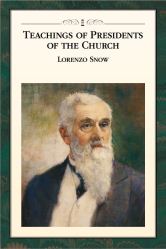
Chapter 16 – That We May Become One
This chapter is a perfect example of how deep we have to go sometimes to distinguish the differences between Christianity and Mormonism. Snow is stressing the need for unity within the Saints and there should be no conflict between them. As a theme and a rule for Christian life, this is not something that Christians can disagree with at all. Matthew 18:15-20 is a clear example of how the Bible sets out clear standards for how to resolve differences between brothers and sisters in faith. This chapter does however point towards substantial differences between Mormonism and Christianity such as the non-Trinitarianism of Mormonism. This chapter also raises other issues such as division between the apostles and whether division is helpful within the church, which shall be explored in this review.
On page 196, Snow makes a very interesting statement regarding the Father and the Son. When Jesus prays for the believers in the Garden, he pleads that the believers are of ‘one’ ‘just as you are in me and I am in you’ (John 17:21). Building on that verse Snow states that:
‘There is something very important in this, and we have got to practice ourselves until we become like the Father and the Son, one in all things’.
This may not seem like a statement of great importance, but when we link the verse itself with other Mormon theology, we can see that this statement is actually very telling. The King James Version of John 17:21 does not mention the terms ‘Father’ or ‘Son’ so Snow has not built this statement on the version of the Bible that the LDS use. Instead this statement reflects the Mormon theology of the Father and the Son. When we investigate the Mormon view of Acts 7 and the stoning of Stephen, we can see that this is the primary text for the Mormon justification of Jesus being a separate god to the Father as expressed in the Pearl of Great Price – Joseph Smith, History 1:17. Bearing this in mind, it is not hard to see how this doctrine has been implanted onto this verse. The changing of terminology from ‘you’ and ‘me’ to ‘Father’ and ‘Son’ may seem innocuous but given the Mormon theology of the separate godship of the Son, it is easy to see that this change could have, and probably has, occurred due to this distinctive heterodox theology
This also leads onto another interesting issue, the lack of any mention of the Holy Spirit in this. To be clear, Mormonism does not teach that the Holy Spirit is not a distinctive ‘godly being’ such as the Father and the Son. McConkie does describe the Holy Spirit as a ‘Personage of Spirit’ who is only in one place at one time and is not manifest (D&C 130:22-23; McConkie, Mormon Doctrine, 1966, 359). This anti-trinitarianism seems to be implicit in this statement. The verse from John does not deny the trinity or make any reference to any distinctive labels of ‘Father’ or ‘Son’. The perfect unity and the perfect unity is in the Trinity, not the Mormon ‘godhead’ but the Trinity. An interesting aside to mention at this point is D&C 20:28 which states that:
Which Father, Son, and Holy Ghost are one God, infinite and eternal, without end. Amen.
The above statement does imply Trinitarian thought within some of the Mormon scriptures. This is interesting when we consider what Snow is saying. Snow is correct in saying the Father and the Son are one in all things but to not include the Spirit not only neglects the three chapters that precede John 17 and the discussion of the advocate but it also neglects the true unity and community as shown in Matthew 28. Snow’s idea of unity for the saints is fundamentally flawed because he neglects the perfect unity that is the foundation of all creation for the Mormon idea of the godhead.
The very next paragraph in page 196 identifies the next issue that we face with Snow’s understanding of unity. Snow argues that:
‘For unless the Apostles and those that believed on them were united, the world could not believe in the mission and purposes of the Saviour’.
This raises some interesting questions about how can humanity can affect the mission of the world but also whether Snow is missing out certain sections of the apostolic ministry and history. One of the key defenses of the Mormon faith is that the apostolic authority was lost after the death of the apostles. Whilst we will not be looking into this in detail, it is important to remember this when we investigate this statement. Galatians 2:12 and Acts 15:7 recounts the disagreement that was had between Paul and James about whether Gentiles and Jews could eat together and how Peter was could in the middle and was making a mess of sitting on the fence. It is fair to say that there was a fair old argument between the three and there were probably some harsh words said. Paul doesn’t really hold back in Galatians about how he felt. This is a clear scriptural sign that there was division within the apostolic community; something that Snow implies should not be the case. The statement implies that the apostolic mission cannot be done if there is division yet it cannot be denied that the work continued and was blessed. Even in the Mormon thought world, the apostolic authority hadn’t been lost yet as the apostles were not dead yet. Snow seems to have completely overlooked this and has also seemed to once again link human efforts to the work of God. The work of God does not stop because of human sin. The Old Testament is full of stories about how the work of God overcame human sinfulness, a perfect example of this is the story of Jonah. To argue that the work of God cannot be done because of human actions limits God. In effect, Snow is saying humanity has power of God, something that is frankly heretical.
Our final point of investigation may seem rather minor in the grand scheme of things, but it does reveal something of the very nature of how Mormonism views debates, argument and disunity in faith. In the section ‘Unity is essential in the Church and in our families’, Snow describes how the quorum of the Twelve is a ‘perfect union’ and the relationship between every branch of the LDS church should also be a ‘perfect union’. This is not a sentiment that I believe to be disingenuous or false on Snow’s part. The flaw with this though is what isn’t said. Snow does talk about not resting day or night until he had union with somebody but there is no description of the ‘hows’. There is always division in any human community; this is a fact of life. Snow’s earlier comments that division will cause us not to be the people of God does overlook, as we discussed earlier, how God sometimes uses our division to bring forth His truth. These sentiments are also unhelpful in dealing with conflict as there are no helpful tools to deal with it. Matthew 18 provides helpful tools to resolve conflict. Unity here is the expected behaviour and if you do not conform for what ever, sometimes justified, reasons then you are not living to the standards that are expected. It would be unhelpful to link this teaching to some of the stories of ‘authoratative’ LDS leadership strategies (e.g. The September Six), but it does suggest that the Mormonism doesn’t allow for some debate and dissention which is unbiblical as the Bible does show us that the Word of God often is clearest at times of dissention.
In conclusion, we can see that our familiar pattern in terms of Mormon thought buried deep with Christian sounding ideas returning in this chapter. Unity within the church is a very Biblical idea and not something that should be mocked or undermined. Snow however does seem to ignore the most perfect unity of the Trinity as well as miss the examples of how God works through division in the Bible which is unfortunate and shows the clear differences between Mormonism and Christianity.

For this month’s Ensign review, I have chosen to focus on an article entitled: “Worlds without Number” by R. Val Johnson. The tagline to this article is: “The heavens declare the glory of God.” which is a quotation from the first verse of Psalm 19. Sounds very Christian and something we should all be able to agree on, doesn’t it? However, as we dig deeper into the article we see that LDS teaching is rarely as straightforward as it first appears.
As if to prove this point, the first line of the article states boldly: “One of the great truths restored in our day is that we are literally spirit sons and daughters of God.” There are two points to be made in response to this. Firstly: the key claim of Mormonism that it contains ‘restored’ truth. Where is the evidence that anything uniquely identifiable as LDS doctrine was ever part of the early Christian church? Polygamy? Temple ordinances? The two priesthoods? And the doctrine outlined here: that we are literal ‘spirit children’ of God? None of these was ever taught or practiced by the early Christian church. There simply is no evidence of such things, so to claim that this is restored truth is not something that can be taken seriously.
This leads directly onto the second point: that we are literally spirit children of God. This teaching is not to be found in the Bible. In fact, in 1 Corinthians 15 we are taught that we are of the earth, and that it is this natural, earthly state that comes first, and the spiritual is second, through Christ. Galatians 4:4-7 helps to explain this point more fully: “But when the fullness of the time was come, God sent forth his Son, made of a woman, made under the law, To redeem them that were under the law, that we might receive the adoption of sons. And because ye are sons, God hath sent forth the Spirit of his Son into your hearts, crying, Abba, Father. Wherefore thou art no more a servant, but a son; and if a son, then an heir of God through Christ.” So clearly, once we are redeemed by Jesus, then we are adopted as children of God, not before.
This claim to be literal sons and daughters of God is backed up in the article by a quote from LDS scripture, in this case the Book of Moses, which can be found in the Pearl of Great Price. Johnson says that Joseph Smith ‘brought to light’ these scriptures. The Book of Moses was written as part of Joseph Smith’s ‘translation’ of the Bible. (It is interesting to note that the only version of the Bible used by LDS members is the King James Version, with only selected verses from the Joseph Smith Translation being included in the footnotes. Why would the LDS church not use their own prophet’s translated version of the Bible as a matter of course? Surely the Joseph Smith Translation restores many ‘plain and precious’ parts to the Bible and corrects the problem of the Bible only being trustworthy ‘as far as it is translated correctly’?)
In the Book of Moses (which, as far as I am aware has no source material, as the Book of Abraham did with the papyri that Smith acquired, or the Book of Mormon which is claimed to be a translation of writings on gold plates), it is claimed that God created men ‘before they were in the flesh’. This directly contradicts the Genesis account of the creation which outlines the creation of the human race at a specific point in time after the creation of the world, in bodily form, rather than before the creation of the world in some kind of spiritual form. If God created man at that specific point in time, as a created being upon the earth, then He could not have also created men ‘before they were in the flesh’.
Johnson then tries to link the point he has just made to verse 28 in Acts 17, where Paul is addressing the Athenians. Paul quotes one of their own poets who wrote that “For we are also his offspring”. Paul is using this quote as part of a wider point he is making that God is so close to us that we do not need to use idols crafted by human hands, as the Greeks did, in order for us to be in relationship with Him, and that, in fact, such idols make intimate worship of God a much harder task. Paul was in no way teaching that God created us as spiritual beings prior to the creation of the world, as is claimed in the Book of Moses.
Johnson wants his readers to see that ‘our Heavenly Father, through His Son, is also the Creator and Ruler of the universe’ since people can sometimes simply focus on God as their Father and forget about the amazing universe that was created by Him, thereby not demonstrating sufficient reverence or awe at the majesty of God. It is important to note here that Mormons believe that the Father, Son and Holy Ghost make up three separate, individual ‘gods’ which form a ‘godhead’, rather than a Trinity of one God made up of three persons.
In LDS teaching, Jehovah and Elohim are the two separate gods (exalted beings) we know as Jesus and Heavenly Father. However, this teaching becomes tricky since the Bible contains numerous verses where it states that Jehovah is Elohim, such as: “Unto thee it was shewed, that thou mightest know that the Lord he is God; there is none else beside him.” Deuteronomy 4:35. Here, ‘LORD’ is a translation of the name Jehovah and God is a translation of Elohim. Therefore it really isn’t possible to talk of a god who is Heavenly Father creating and ruling the universe ‘by’ or ‘through’ another god called Jesus. They are one and the same God. What is possible however, is to look at John 1:1-3 and see that, “In the beginning was the Word, and the Word was with God, and the Word was God. The same was in the beginning with God. All things were made by him; and without him was not any thing made that was made.” And just to clarify that this ‘Word’ is referring to Jesus we have verse 14: “And the Word was made flesh, and dwelt among us”.
So, according to the Bible, Jehovah (or Jesus) is God and ‘there is none else beside him’, and Jesus was ‘in the beginning’, he was both ‘with God’ and ‘was God’ and all things were made by him. This points to the Trinitarian view, and not the LDS view. Remember that the Bible consistently teaches that there is one God and refers to Jesus as God on many occasions. Jesus even refers to himself as God: “Before Abraham was, I am” John 8:58
Johnson goes on to quote the Doctrine & Covenants in order to show the power of God. He quotes section 88 which describes the light of God which “proceedeth forth from the presence of God to fill the immensity of space. The light which is in all things, which giveth life to all things, which is the law by which all things are governed, even the power of God who sitteth upon his throne, who is in the bosom of eternity, who is in the midst of all things” According to these verses, this light which proceeds from God is his power and it fills the immensity of space. This fits in with the LDS view that “He has a body that looks like ours, but God’s body is immortal, perfected, and has a glory that words can’t describe.” (From Mormon.org)
So logically, God can’t be omnipresent since he has a physical body, but his power can. This in conflict with the Bible: “Do not I fill heaven and earth? saith the LORD.” Jeremiah 23:24 and “Whither shall I go from thy spirit? or whither shall I flee from thy presence? If I ascend up into heaven, thou art there: if I make my bed in hell, behold, thou art there. If I take the wings of the morning, and dwell in the uttermost parts of the sea; Even there shall thy hand lead me, and thy right hand shall hold me.” Psalm 139:7-10 In the Bible God fills heaven and earth, in Mormonism God has a body and it his light or power that fills the ‘immensity of space.’
R. Val Johnson then goes on to make an astounding, unsubstantiated claim: “That promised knowledge is being revealed to us by faith, foremost in the revelations of the Prophet Joseph Smith.” Johnson is here referring to the knowledge of the workings of the universe. I am stunned that Johnson has made this claim. Please remember that, in the Book of Abraham, Joseph Smith wrote: “And I saw the stars, that they were very great, and that one of them was nearest unto the throne of God; and there were many great ones which were near unto it; And the Lord said unto me: These are the governing ones; and the name of the great one is Kolob, because it is near unto me, for I am the Lord thy God: I have set this one to govern all those which belong to the same order as that upon which thou standest.” Is this quote really supposed to represent some development in our understanding of the workings of the universe?
Or consider Smith’s successor, Brigham Young, here talking about the Sun: “Do you think it is inhabited? I rather think it is. Do you think there is any life there? No question of it; it was not made in vain.” Journal of Discourses 13:271 I wonder if Johnson genuinely thinks that the LDS church has anything to offer the fields of astronomy and astrophysics. He swiftly adds that this growing knowledge ‘is also coming to us by study.’
There follows some interesting facts and statistics regarding God’s creation. Johnson suggests that as we know and understand more and more of the universe that surrounds us, we should express gratitude that the creator of it all is our ‘father’. This leads to the suggestion by Johnson that we should ‘gladly obey His counsel and, with eagerness, receive the ordinances and covenants that will guide us to eternal life with Him’. Mormons reading his article will understand that he is clearly making a strong allusion to the ordinances and covenants that take place in their temples. We know that these ordinances are essential steps on the path to becoming a god. See Chapter 47 of Gospel Principles
This leads on neatly to another issue raised by Johnson. Further into the article he says: “The universe, in fact, may be infinite in size. And God controls it all.” If God controls an infinite universe, where can other exalted beings have their own creations? Would they then have to share the universe that God controls? If so, how could they be an authentic god? Would they create a new infinite universe? Could it be possible to have more than one infinite universe? It is clear that Joseph Smith believed that there must already be many gods in existence: “If Jesus Christ was the Son of God, and John discovered that God the Father of Jesus Christ had a Father, you may suppose that He had a Father also. Where was there ever a son without a father? And where was there ever a father without first being a son? … Hence if Jesus had a Father, can we not believe that He had a Father also?” (Teachings of Joseph Smith, section 6 p.373) So I wonder how all these exalted beings or gods can exist if there is only one infinite universe controlled solely by God.
Johnson continues his theme that Joseph Smith has added to our understanding of the universe by quoting D&C 76:24 which states: “by him, and through him, and of him, the worlds are and were created, and the inhabitants thereof are begotten sons and daughters unto God.” Clearly, this is a statement that cannot be verified by science, and certainly, from a Biblical point of view, we know that inhabitants of this planet are not begotten sons and daughters of God. We are made or created in his image. We are not begotten, which implies the existence a literal child – father relationship. As stated above, the Bible makes it plain that we are only adopted as God’s children through the redemption of Christ.
There is an additional quotation at the end of Johnson’s article from Dieter Uchtdorf of the First Presidency, who says: “We have the incomprehensible promise of exaltation—worlds without end—within our grasp. And it is God’s great desire to help us reach it.” When I read these words, I cannot help but think of the words of the serpent (i.e. Satan) in the Garden of Eden when, in tempting Eve to disobey God’s command, he enticed her with the suggestion: “ye shall be as gods.” Genesis 3:5 God’s great desire is not, as Uchtdorf suggests, that we can be exalted or in other words become gods. That is the suggestion of the Devil in his encouragement to Eve to disobey God! God’s great desire is for us to have eternal life. Jesus has the power to grant eternal life. John 17 explains clearly how we may receive eternal life: “thou hast given him power over all flesh, that he should give eternal life to as many as thou hast given him. And this is life eternal, that they might know thee the only true God, and Jesus Christ, whom thou hast sent.”
So to anyone reading this, I ask, do you have eternal life? Do you know the only true God?

